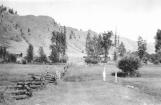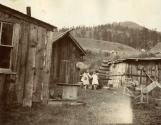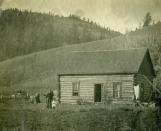1
The Jackson homesteadDate unknown
The Kettle River Valley
 Credits:
Credits:Kettle River Museum
Donated by Nora Eveleth, 1979
2
"Besides breaking the land and producing crops, these people built their homes, barns and other buildings as well as constructing miles of rail fences.The cabins were small in the early days, with a lean-to where odds and ends were kept handy. The lean-to had a roof but was partly open and housed the woodpile, mower knives, butchering tools and many items that were frequently used. The first houses and other farm building were built of logs..."
- from "A Harvest of Memories" by Bill Hatton, 1985
3
Up at the Fred Davis placeCirca 1910
Benchlands of the Kettle River Valley
 Credits:
Credits:Kettle River Museum
Donated by Nora Eveleth, 1978
4
"...My father came back to the Boundary district to make a home; a two-room cabin was built on a pre-emption at Kerr Creek. Then father, his brother James Kerr, and James P. Flood went into the cattle business. In July 1893, father journeyed again to Chilliwack to be married to Elida Casselman... Here started the real pioneer life. Having arrived at her home on Boundary Creek, what a surprise awaited the bride. The cabin had no roof; the windows were holes; but who cared! My parents were young. Here was adventure in the making.On November 24th, 1894 I, the first white child on Boundary Creek, was born. A year or so later a butcher shop was opened by the three partners in Grand Forks. My family moved to Grand Forks. In a small house situated on the present hospital site my sister Edna was born. However, the range life soon called my father back to the pre-emption on Kerr Creek.
Boundary Falls was the social centre of the district. Dances were held in the hotel dining-room. Baby-sitters were unknown, the little ones blissfully slept on benches, or in well-padded corners while the young parents made merry."
- from "Robert Duncan Kerr" by his daughter Alice Kerr MacMillan, Boundary Historical Society 4th Report, 1964
5
A Kettle River Valley homestead in the early days1900
The Kettle River Valley
 Credits:
Credits:Kettle River Museum
Donated by Nora Eveleth, 1978
6
Along the wagon road past an unknown homesteadCirca 1900
The Kettle River Valley
 Credits:
Credits:Kettle River Museum
Donated by Nora Eveleth, 1978
7
"Our growing season here is not a long one, and in the older days of horse drawn implements, the time between when the snow went and time for seeding came was short and all the land had to be worked several times... Before mechanization, the horse was king and keeping him in good working condition would mean a profitable operation, since work had to be done as the seasons demanded... The farm supplied the feed, and when crops were light there were no large fuel bills, as happened after the machines came. Hay and oats were the crops generally raised since there was a ready market in the logging camps and livery stables."- from "A Harvest of Memories" by Bill Hatton, 1985
8
Old style haying on the Jackson RanchCirca 1910
The Kettle River Valley
 Credits:
Credits:Kettle River Museum, Sonny Jackson collection
Donated by the estate of Mike Downing, 1977
9
"The hard work of forking loose hay from a stack had to be done every day. The hay was fed in the snow where the cattle droppings accumulated and enriched the land for the crops. In the days when grain was threshed, there was an abundance of straw and a rick load was taken out daily. The animals would pick out the chaff and bed down in the night on the coarse straw. Cattle would stay out all night in winter, except on very cold nights when they would come to the cattle shed in the barnyard."- from "A Harvest of Memories" by Bill Hatton, 1985
10
Hauling a heavy load in Christian ValleyDate unknown
The Kettle River and its tributaries
 Credits:
Credits:Kettle River Museum
Donated by Mrs. Rae Lee, 1994
11
"The hauling of hay and grain to the villages of Rock Creek and Riverside was a slow process with heavy teams of horses. Two to two-and-a-half tonnes was the usual load since it was mostly downhill to the valley. The old road from Harry Brown's ranch at the top of the Rock Creek hill was steep, narrow and winding. The long, three-hour trip home in the sometimes below zero weather seemed never-ending since the pace was never increased over a walk. The driver walked beside the team as it was too cold to ride.When taking produce to market, men would sometimes be away for up to four days, and this would mean a full time job for the farmer's wife doing chores. During winter cattle would have to be fed, as well as pigs and chickens. On most farms there would be dairy stock that needed milking thrown in along with other responsibilities."
- from "A Harvest of Memories" by Bill Hatton, 1985
12
Helping with the milkingCirca 1900
Westbridge, BC
 Credits:
Credits:Kettle River Museum
Donated by Mrs. Rae Lee, 1994
13
William G. Moll keeping the home fires burningCirca 1915
Midway, BC
 Credits:
Credits:Kettle River Museum
Donated by William Moll, 1978
14
The Many Warms in WoodPull up a chair beside the heat
Or stand and warm your back and seat
And come with me down memory lane
When saws lacked motors or a chain
When all our fuel was cut from logs
For cooling, heating and scalding hogs
From early youth we understood
The many warms there were in wood
First we took a crosscut saw
Cut down a tree and watched with awe
As slowly gaining speed it fell
We sawed off logs, got warm as well.
With horses sweating and teamster too
The logs were skidded a mile or two
And when old Maud balked as she used to do
The air around turned a smoky blue.
A horse powered saw sat near our home
But it wouldn't do the work alone
Someone had to drive the team
Going around and around soon raised some steam.
Blocks of wood had to be carried away
Stored in the shed for another day
A warming job when your weight you pull
But satisfying when it was full.
Then every day before it was night
A sweat was raised splitting it right
The wood box had to be filled to the top
That chore sure kept you on the hop
If the wood in the boxes ever ran out
You'd hear Ma yell "Where is that lout?
I'm out of wood" you'd hear her holler
Sure made her hot under the collar
By the old woodstove of a winters morn
We clustered around to get warm
In evening again as the cold crept in
It was the centre of warmth for friends and kin
Now all these warms as sure as fate
Has caused the wood to dissipate
For the woodshed empty so it is plain
We'll have to get more wood again.
- Verdun T. Casselman